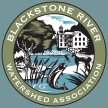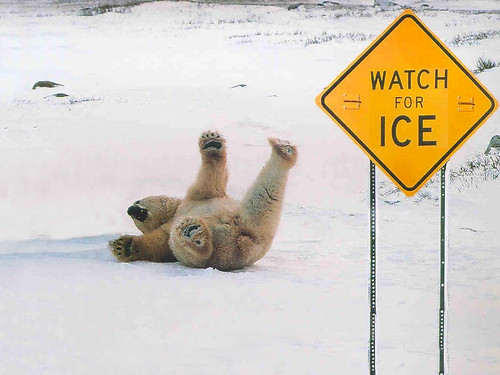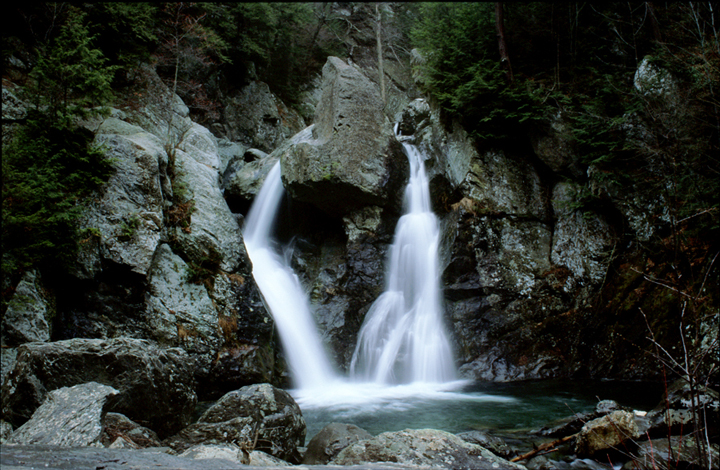|
Blackstone River Watershed Association
|
|
|
BRWA NEWS
|
Walking in a Winter Wonderland!
Hikers on the BRWA's hike at Hassanamesit Woods learned about the
Muckamaug family's land, and the use of “stone wrapping” by later
land owners to open up stone walls for wagons and farm equipment.
Photo: Pieter Dejong
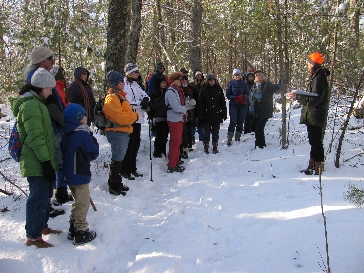
|
Approximately 50 people joined the BRWA on
Sunday, January 26th for a gorgeous and fascinating trek through
Hassanamesit Woods in Grafton! We had blue skies with abundant sunshine
that made the fresh (pre-blizzard) snow sparkle as we made our way
through oak forests, over wooden bridges, across gurgling streams, past
stone walls, up rocky ridges, and past a vernal pool before winding
our way through pine woods to the finish. Afterwards, we refreshed
ourselves with hot cider and cocoa, cookies and brownies.
These 200 acres drain to Misco brook, which empties into the West
River before joining the Blackstone River. As we hiked through woods,
fields, and wet areas, we were reminded about the need to protect land
like this to ensure better water quality in the Blackstone.
Hassanamesit Woods includes two stream wetland systems
including this northern one that the trail crosses.
Photo: Joanne Holahan
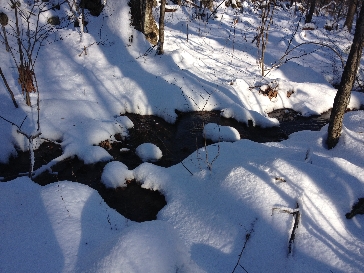
|
During the hike, we also took a journey through history. We talked
about the prehistoric use of the area and the Hassanamisco clan of
Nipmuc Indians that lived here prior to English settlements. We
discussed the establishment of John Eliot's Hassanamesit Praying
Village and the subsequent town of Grafton. We ended our time travel
with the orchards and agricultural farms of more modern times, the
residential development in the 1950s, and the ultimate foresight of
Roger Robinson, the Trust for Public Lands, and the town of Grafton
to keep this land as magnificent open space for us to enjoy during our
winter hike!
top
|
|
CALENDAR OF EVENTS
|
World Wetlands Day is February 2 and
commemorates the 1971 adoption of the Convention on Wetlands in
Ramsar, Iran. The event is designed to raise awareness around the world
of the importance and value of wetlands. This year's theme is "Wetlands
for our Future" with a special focus on "agriculture and wetland sectors
working together along with the water sector to secure the best possible
outcome. " More information can be found at
http://www.ramsar.org/activity/world-wetlands-day-2015.
|
Now that snow has finally arrived, opportunities
for cross-country skiing, snowshoeing, tracking, and wildlife viewing, along
with seasonal ranger-led programs can be found in Uxbridge at West Hill
Dam {508- 278-2511} and River Bend Farm (508-278-7604).
|
|
2/7
|
Presentation on the Blackstone Canal by Dave Barber.
Blackstone Historical Commission. 1 p.m.
Blackstone Town Office, St. Paul Street.
info
|
|
2/18
|
Blackstone River Watershed Council Monthly Meeting.
6:30pm - 8:30pm. Lincoln RI.
info
|
|
2/25,26
|
2015 Conference and EcoMarketplace of the Ecological Landscape Alliance.
Springfield, MA. Includes workshop on
"New Strategies for Water Conservation and Protection".
info
|
|
2/26
|
BRWA Board Meeting.
6:45 p.m. to 8:00 p.m. 271 Oak St., Uxbridge.
info
|
|
2/28
|
Mass Association Conservation Commissions Annual
Environmental Conference.
College of the Holy Cross, Worcester.
info
|
|
3/9
|
Water Conservation: Landscape Design Strategies Webinar.
Ecological Landscape Alliance. 5:30 - 6:30 p.m.
info
|
|
3/18
|
Blackstone River Watershed Council Monthly Meeting.
6:30pm - 8:30pm. Lincoln RI.
info
|
|
3/21
|
Blackstone River Coalition's Annual Volunteer Water Quality Monitoring Summit.
9:15 a.m. - noon. Hopedale Community House,
Hopedale. RSVP: Susan Thomas, acadia94@verizon.net
or 508-839-9488.
|
|
3/26
|
BRWA Board Meeting.
6:45 p.m. to 8:00 p.m. 271 Oak St., Uxbridge.
info
|
|
3/28
|
Blackstone Canal Clean Up.
8 - 12 a.m. 15 St. Paul St., Blackstone, MA.
|
top
|
THINK GLOBAL, ACT LOCAL
|
Report Card and Volunteers
The Blackstone River Coalition (BRC), the
umbrella organization that assists local watershed groups like the BRWA,
is sponsoring its Annual Water Quality Monitoring Summit and Volunteer
Appreciation Breakfast on Saturday, March 21st in Hopedale, Mass.
Volunteer monitors from all 75 sites of the watershed-wide program are
invited to the event being held from 9:15 a.m. to noon at the Hopedale
Community House on Hope Street.
Volunteers will hear about the BRC's Report Card for the 2014 season in
which grades of excellent to poor are assigned to monitoring sites
throughout the Blackstone River watershed based on physical, chemical,
and aesthetic data collected April through November of last year.
Richard Hartley, Fisheries Biologist with the Mass Division of Fish and
Wildlife, will give the Keynote address on the status of fish in the
watershed and the research currently underway - a timely topic as the
BRC kicks off the next phase of its campaign for a Fishable/Swimmable
Blackstone!
Anyone interested in the quality of the Blackstone River and its
watershed should plan to attend. If you've ever thought of becoming
a volunteer monitor, the Annual Summit is the place to begin! Please
R.S.V.P. to Susan Thomas,
acadia94@verizon.net
or 508-839-9488.
top
|
Water Quality Degraded
by Road Salt Application
Last December, the U.S. Geological Survey
released a report summarizing its findings on the contamination of
streams by chlorides used in pavement deicing. The study was conducted
between 1960 and 2011 on streams in eight states and Washington, D.C.
It found that, from 2006 to 2011, the EPA's standard for levels of
chloride in freshwater systems (230 mg/l) was exceeded nearly one third
of the year for 29% of the sampling sites. The study also documented
that this toxicity is occurring much more frequently in the last decade compared with the previous one.
Toxic levels were correlated with snowy urban areas where salt is
regularly used to deice pavement on roadways, sidewalks, and parking
lots. The majority of the contamination, however, is caused by municipal and state
operations in northern states.
When surface waters are contaminated by road salt via snowmelt and
stormwater runoff, freshwater organisms that are sensitive to chloride,
including brook and rainbow trout, bluegill, American eel, caddisfly,
and water fleas, are harmed or killed. This has additional implications
throughout the aquatic food web when you consider all the fish, mammals,
herps, insects, and birds that prey on these species.
Furthermore, the study suggests that the chloride used in deicing makes
its way into groundwater systems. Not only does this degrade public
water drinking supplies, it also contaminates surface waterways over the
course of dryer months when groundwater gradually releases back into streams.
One of the main conclusions from the USGS study is that more needs to be
done to identify or develop deicing materials that provide for public
safety AND also protect the environmental integrity of our freshwater
aquatic systems. The Massachusetts DOT reports that it used over
585,000 tons of road salt during the 2013-2014 winter. This winter, as
the piles of snow around the Blackstone River Watershed build up, so should
our commitment to finding a better way to keep our roadways clear.
top
|
|
MY BLACKSTONE
|
Inward Reflection vs. Outward Bound
By Tara Neal, BRWA Board Member
I enjoy walking in the woods any time of year, but
there is something special about a woodland walk on a crisp, sunny autumn day.
For me, when the bright sunlight filters through the trees and reflects off
the river, the whole world seems to be aglow in an array of red, orange and
gold. Basking in that autumn glow for even a few moments never ceases to
rejuvenate me. One afternoon this past October, after a busy stressful week,
I took a walk at the Blackstone River and Canal State Heritage Park in
Uxbridge hoping for some peaceful rejuvenation. I did, however, have my three kids along
with me, ages 7, 5 and 3, so my expectations were pretty low.
Our path started at Plummer’s Landing, heading down the trail alongside the
Blackstone River, and turning back at Goat Hill Lock. When we began, I asked
the kids to admire the trees and name how many colors of leaves they could see.
They played along with me for a moment before sprinting down the trail
pretending to fight Creepers (a Minecraft reference). When I managed to get
them to stop by a downed tree and speculate about what event might have led
to it falling over the river, they preferred to speculate as to how far they
could walk across said tree. When we reached an area where the river had
breached the towpath and loose branches were gathering up, I pointed out that
the river is not fixed, but always changing. The kids were more focused on
the merits of the spot for a good fort. And at a bridge crossing, I
suggested they stop for a moment and listen to the river; they preferred
to race across the bridge as fast as they could.
There was little rejuvenation for me that day, but I did not mind. While our
agendas may have been different – I was looking for a sense of peace and my
kids were looking for adventure – we enjoyed the outdoors together. That is
what mattered the most.
top
|
|
BE GREEN
|
 Healthier Deicing
Healthier Deicing
No one is immune to slipping on icy steps or
walkways. Traditionally, rock salt (sodium chloride) has been used to
provide safer passage. But as the article in Think Global explains,
sodium chloride degrades local waterways and ground water.
Fortunately, there are alternatives for clearing away ice or at least
providing better traction around your home or business. And as more
research is conducted regarding road and highway use, it is hoped that
additional products will hit the market that do not adversely affect
the environment. Do not use clean cat litter, as some sources suggest,
as it will eventually form a clayey mess that is difficult to clean up.
Urea is also marketed but can degrade water supplies. Here are some
better ideas to try:
- Products containing magnesium chloride and sodium acetate
- Beet juice mixed with brine
- used coffee grounds
- baking soda
- sand (often provided free at town DPWs)
- shoveling early to prevent ice build up
Green de-icing tips from:
Michael Bloch
Green Living Tips.com
Green Living Tips is an online resource powered by renewable energy
offering a wide variety of earth friendly tips, green guides, advice
and environment related news to help consumers and business reduce
costs, consumption and environmental impact.
top
|
|
REFLECTIONS
|
“It is not half so important to know as to feel.” Rachel Carson
The Two Streams
By
Oliver Wendell Holmes Sr.
Behold the rocky wall
That down its sloping sides
Pours the swift rain-drops, blending, as they fall,
In rushing river-tides!
Yon stream, whose sources run
Turned by a pebble’s edge,
Is Athabasca, rolling toward the sun
Through the cleft mountain-ledge.
The slender rill had strayed,
But for the slanting stone,
To evening’s ocean, with the tangled braid
Of foam-flecked Oregon.
So from the heights of Will
Life’s parting stream descends,
And, as a moment turns its slender rill,
Each widening torrent bends,—
From the same cradle’s side,
From the same mother’s knee,—
One to long darkness and the frozen tide,
One to the Peaceful Sea!
The Poetry Foundation
top
|
Views & opinions expressed in linked websites do not necessarily
state or reflect those of the BRWA.
|
|
Your input is crucial to this eNewsletter. If you have a local
watershed-related story, information of interest to our subscribers, or
comments about this publication, drop an email to the editor.
The Blackstone River Watershed Association (BRWA) has a mission to
engage, educate, and advocate for improved water quality in the Blackstone
River Watershed; its objectives are to:
- Engage the public in watershed stewardship activities,
- Educate members, supporters, and residents on watershed protection strategies, and
- Advocate to local residents, community leaders, non-profit partners, and
state regulators to take actions that will help to ensure our waterways continue
to provide healthy habitat and enjoyable recreational opportunities.
The BRWA eNewsletter is published monthly by the Blackstone River Watershed
Association. BRWA is a 501(c)(3) non-profit organization.
Editor: Susan Thomas susan.thomas@thebrwa.org
Mailing address: BRWA, 271 Oak Street Uxbridge, MA 01569
Phone: 508-278-5200 Web: www.thebrwa.org
Click here for back issues.
|
|
